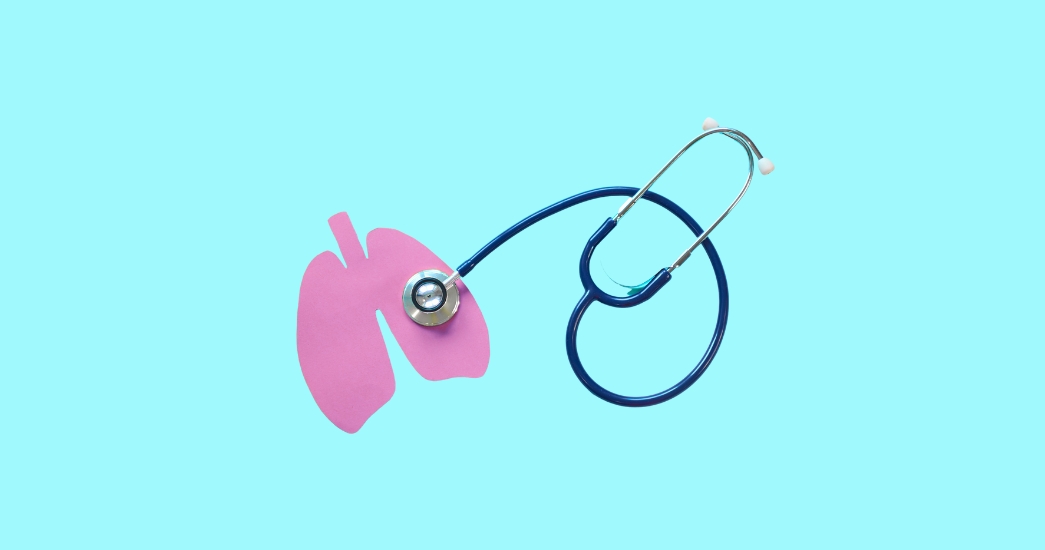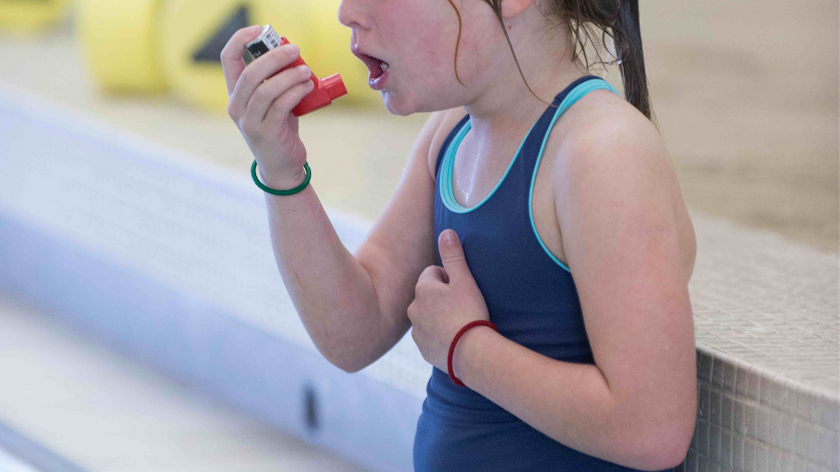Chlorine Cough After Swimming
When air quality is bad in a natatorium, swimmers, coaches, lifeguards, and spectators all suffer. Exposure to airborne chloramines irritates lungs and can cause swimmers to cough. Chlorine cough often lasts for many hours after swimming.
Covered in this article:
- What is chlorine cough?
- The health consequences of chloramines
- How to stop coughing after swimming
- Dilution and circulation
- Source-capture exhaust
- Mistakes to avoid
- Goals to strive for
- Conclusion
What is chlorine cough?
The best way to describe breathing in chloramine vapor is a dry burn that leads to a dry cough. The throat gets dry, itchy and sore. Sinuses flare up, and lungs burn. Swimmers reflexively cough, which is (obviously) difficult during swimming. It's miserable.
Competitive swimmers are all too familiar with this feeling, especially during a busy swim practice when breathing is heavy and the pool is packed with swimmers. The more people in the natatorium, the worse the air can become. Especially when they pee.
The byproducts of chlorine oxidizing bather waste off-gas into the air. These airborne chloramines and other DBPs are the main reasons that swimmers cough during and after swimming.
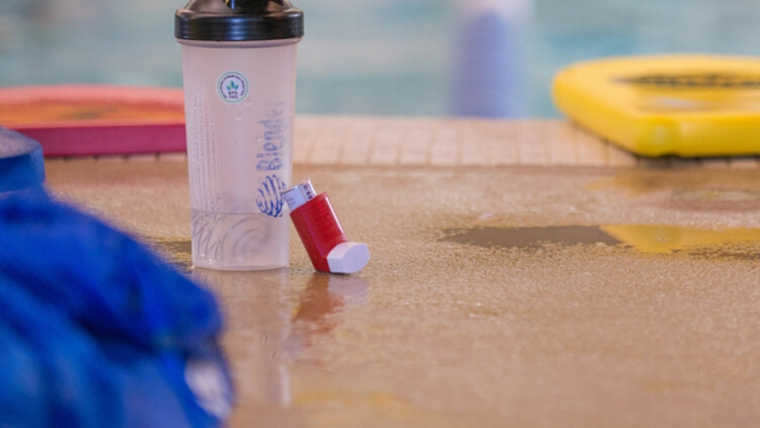
So what is chlorine cough? According to the Cleveland Clinic, the medical condition is known as tracheobronchitis.1 Tracheobronchitis is an acute condition that is usually caused by a bacterial infection or irritants like cigarette smoke.2
Chlorine cough (or swimmers cough) however, is specifically caused by inhaling airborne chloramine pollution off-gassing from indoor swimming pools (and wet decks).
As mentioned in previous articles, the term chloramines generally refers to all airborne disinfection byproducts (DBPs) in the air in a natatorium, including trihalomethanes (THMs) like chloroform.
Since chloramines and other byproduct gases are heavier than oxygen, they stay low in the natatorium, right above the surface of the water and the wet deck. The worst air in the room is concentrated in the bottom of the room–thanks to gravity–which happens to be the swimmers' breathing zone.
And swimmers are not breathing normally while training; they are exercising and holding their breath underwater, so swimmers gasp when they inhale. This leads us to our next topic...
The health consequences of chloramines
The health impacts of breathing airborne chloramines are well-researched, and in our experience, self-evident. We have aggregated many of the peer-reviewed resources for you on our research page. We just mentioned tracheobronchitis as an acute condition that can be caused by irritants like chloramines. Now let's look at the long-term consequences.
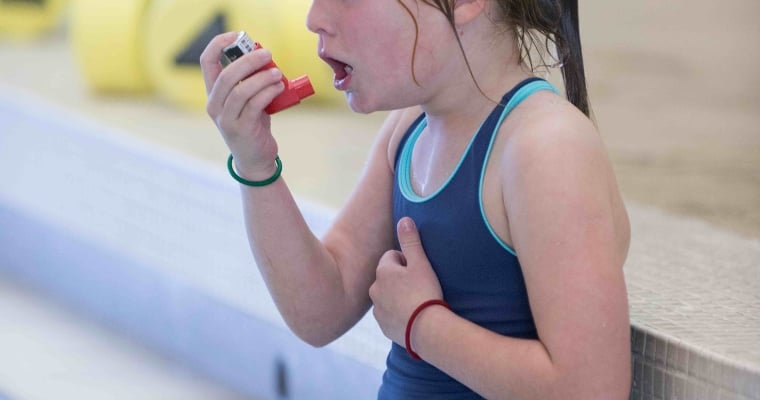
Swimming indoors is directly correlated with countless cases of sport-induced asthma, bronchitis, and other respiratory distress. For those with prolonged exposure, like me, there is even a condition nicknamed "lifeguard lung", which is characterized by scarring of lung tissue. The medical name is endemic granulomatous pneumonitis, and it is a problem worldwide.
Most people who spend a lot of time in natatoriums merely notice the discomfort, irritation, and 'mugginess' of a hot, humid room. The fortunate ones are able to recover pretty quickly after they leave, but many are not as lucky.
Related: Swimming pool air quality resources
In my personal experience, I can remember coughing fits for hours after leaving the pool. Sometimes it was mild, and other times it was almost like a barking cough after swimming. So loud that it made it impossible to sleep through the night.
Many swimmers that I know have developed chronic bronchitis from swimming indoors. Thankfully I am not one of them, though the scarring in my lungs is real. No matter the severity of someone's symptoms, the research is clear: breathing in airborne chloramines is unhealthy.
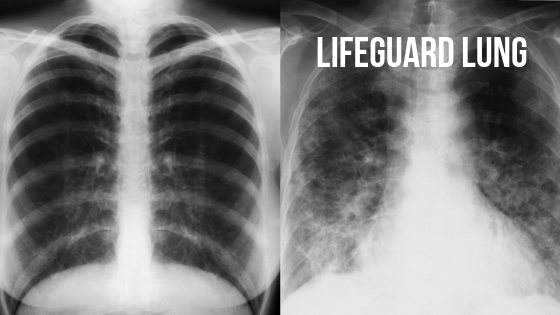
And yet, chloramines are inevitable in a chlorinated swimming pool.3
Related: How to Reduce Combined Chlorine
How to stop coughing after swimming
First of all, I am not a doctor and I do not pretend to be. If you or your child is coughing at night after swimming, they are not alone. Consult your doctor about it. Nothing we publish is intended to substitute for a doctor's medical diagnosis.4 That being said, here are some tips that helped me during my swimming career, and maybe they can help you or your loved ones who are struggling with chlorine cough:
- Drink more water to stay hydrated. Swimmers dehydrate surprisingly quickly. We don't feel when we sweat in the water, but rest assured, we do. Hydration is critical, and when I was dehydrated I found I was sicker more often and felt more throat and lung irritation. Maybe it was coincidence and not directly related, but it seemed to make a difference for me.
- Sleep more. Let's face it, swimmers tend to train EARLY in the morning, and in college, the afternoons too. Lack of sleep weakens the immune system.
- Use an air filter in the bedroom. While there are no chloramines in the bedroom, dust and other allergens are. There are plenty of air filters on the market that remove many of these floating particles from the air. These dust particles further irritate the throat and lungs, especially when they are already inflamed from swim practice.
- Use a humidifier in the bedroom. Especially in the colder seasons, the air can get dry. More humid air (50-60% RH) is optimal, especially when sleeping.
- Throat lozenges help soothe an irritated throat.
- If your doctor prescribes it, in extreme cases, an inhaler can help. But be cautious about this! Make sure the inhaler does not contain any banned substances. My inhaler was albuterol, but some other inhaler medications are considered performance-enhancing drugs–namely clenbuterol.5 Make sure your doctor knows the circumstances and that any prescription given is clear of any banned substances by USADA and WADA.
- Standard cough medicine may provide temporary relief, but in my experience, it was never an effective swimmers cough treatment. Swimmers cough comes from deep within the lungs. It's hard to describe unless you experience it (and I hope you do not).
How long does chlorine cough last?
Everybody handles chloramines differently. Some swimmers seem unaffected by bad air quality, while others can find themselves in the back of an ambulance during a championship swim meet. If the chloramine exposure is severe, chlorine cough can last a few days and nights.
Long-term exposure may not have the same severity of coughing, but the health impacts are quite real. For instance, my coughing fits were the worst when I would swim in other pools that I was not used to. Sure, there was coughing in my home pool too, but it was predictable and not as severe. The worst coughing fits would last days, and led to other illnesses like a cold and sometimes the flu.
But here again, that was my experience with swimmers' cough. Everybody is different.
Conclusion
Swimmers cough because of airborne chloramines. There is an abundance of research showing that inhaling these airborne pollutants is unhealthy. Hopefully, you and those you care about do not have the same severity of breathing issues that I had. Swimming indoors gave me sport-induced asthma and lifeguard lung.
Chloramine Consulting exists to eradicate the problem from every natatorium we can reach, so that swimmers, lifeguards, and everyone else who spends time in indoor pools do not have to be exposed to the same pollutants. If swimmers are coughing in your natatorium, step one is diagnosing why there's a chloramine issue to begin with, and that's where we come in. We can evaluate your facility so the facility owners/operators can make informed decisions on how to address chloramines proactively.
1 (2023). Can indoor pools cause chlorine cough? Cleveland Clinic.
2 (2018). Tracheobronchitis. Healthline.
3 Chloramines are inevitable byproducts in a chlorine pool. Or, in the case of a brominated pool, bromamines are the inevitable byproducts. We say inevitable because we need chlorine disinfection. Unless there's a way to completely prevent bather waste from getting in the water (which there is not unless the pool is closed), these pollutants will be created.
4 ....that being said...when I was swimming in college and continued to get sick and no matter what I tried, I could not figure out how to stop coughing after swimming, the doctor told me I was "allergic to chlorine". He was sure that was my issue. I was prescribed an albuterol inhaler and told to go outside more often for fresh air. Years later I learned about chloramines, and recognized immediately that I'm not allergic to chlorine–which had never bothered me in outdoor pools–I was sick because of airborne chloramines. The sad part is, knowing what we know today, I'm pretty confident the prescription would remain the same.
5 One such banned substance is called clenbuterol. It is a bronchodilator that is used to treat acute asthma in patients, but it is also considered a performance-enhancing drug by the DEA and the US Anti-Doping Agency (USADA). It can even show up in contaminated meat, which has triggered positive test results in athletes.

 By
By
